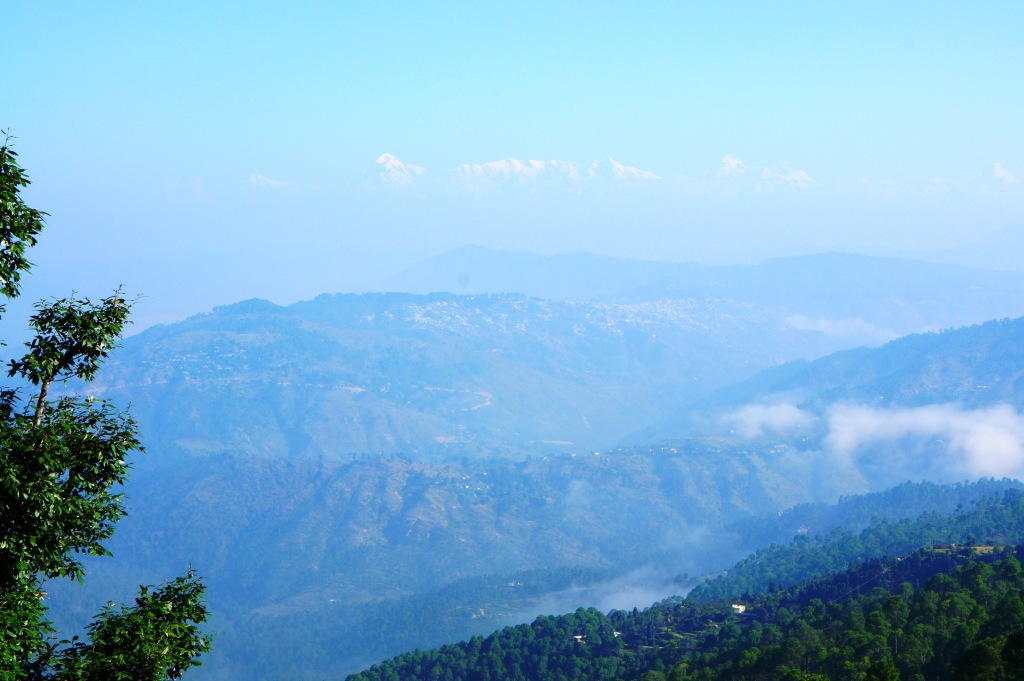My T-shirt and the only surviving pair of jeans (I have lost a lot of weight, thankfully!) had stains all over them and I was staring and scraping at them while trying to hold a conversation. I had not been involved in a fight nor had come after playing around in the mud, though I wish I could do at least the latter (age is really just a number. Mud is for all!). I was in the fruit processing unit that Kumaon Grameen Udyog runs, making jam with my colleagues.
The jam in its path to the right consistency was boiling, bubbling up and down and splashing itself on the people around. An apron would have done just fine to protect my clothes excepting when the jam would deliberately look for places uncovered with the apron (I doubt such a conscious effort on any jam’s part but I have had jam splashed on my face when I was well away from the cooking vessel so I cannot discount that) but I, in my supposedly infinite and superior wisdom which is usually based on keeping things simple, had no inclination to wear one because I thought as I am getting my hands dirty doing this fellowship, why not get my clothes dirty too! I will finally get a reason to indulge in laundry at last, and a lot of people will in turn feel happy especially Maa. Nothing’s better to a mother than her son wearing clean clothes, if her son is like I am.
So as I said earlier, which I forgot in the sentences following it, I was trying to hold a conversation while scraping the stains away and the colleague I was having a conversation with, was stirring the concoction of mostly natural and sparingly used synthetic constituents that make up our jam (we are building up capacity for a fully natural product. It will take us some time and understanding to get there). I was listening intently I supposed. But perhaps I wasn’t for I could not comprehend any thing except that she was sharing something about what had happened some time before.
I could know only that because she kept using the past tense and the word “परसों” i.e. day before yesterday. Failing to understand what she was trying to convey I decided to give up scraping and look up while simultaneously admitting to myself for the umpteenth time in my life that I cannot multitask however simple may be the tasks.
As I looked up I said, “Can you repeat that again but slowly?”
She recited all of that again. I still felt at bay. I raced my mind to the recent past but I had to give up. I was about to ask her to repeat it again but one thing from her conversation suddenly struck me. I paused. I could finally comprehend what she was talking about. Though I still had doubts about the time all of that had happened. After thinking for a while, during which she stared at me, bewildered, I confidently said that all of that which she was talking about had happened three months earlier and not in the recent past which she kept referring to. She agreed. I was surprised that how she could agree with something which she had not even referred to.
I thought to myself, may be this is one of those times when both the communicating persons are at bay about each other’s thoughts even after having expressed, and do what you may none will understand. I have had a lot of those so I could not discount the possibility of it happening again. But I decided to pursue it further this time and asked her how with the usage of the word “परसों” can she refer to three months earlier? To which she had a simple response, “That is परसों only.” And she rested her case.
When I had first come to my organization, I was not in a habit of walking to places nor familiar to the distances and the routes. I was walking to Sitla once via the road for the first time (I had always taken the nature trail otherwise) and I was told that it is quite near. I walked and walked and walked and walked until I finally reached, ending up realizing that the oft quoted remark ‘near, yet far’ holds true at least some where. A lot of times in my interaction with the local people in my field area, I have been surprised with their usage of परसों to refer to the past events unlikely to have been remotely from the recent past and their references to places being very near. I wondered as to what could be the cause for the widespread use.
I walk to places a lot of times, alone and sometimes with Markus, who has clicked the featured image of this blog and who graciously gave it. I walk with him because he is very lucky at coming across animals. But he runs out of luck when he is with me. My walks’ other objectives include withdrawing money from an ATM at Mukteshwar (6km walk through a beautiful natural trail from where I live) and to get a chance to gaze at the Himalayas from Sitla and Mukteshwar (which are visible only during the winters). They stand tall as large white corrugations against the sky.
I have inquired locally about how far, aerially, are the Himalayas. I could only get to know their distance by road and by time! I looked up Google maps then and I came to know that the aerial distance is a hundred kilometers. I could hardly believe it. I had always thought that they would not be more than 20-30km away. It is hard to believe that you can look at something that is so far away. But one can, for the Himalayas are gigantic. It took me a while and a lot of trips to Sitla and Mukteshwar to make my peace with the fact.
In one of those trips to the two places, I stopped in the tracks as a certain postulation started forming about the Pahaadi measurement of time and distance. What if, it is the Himalayas that are an inspiration of Pahaadi people’s measurement of time and distance? As the Himalayas themselves are so far away yet visible. And probably in comparison to the Himalayas, nothing seems far to the Pahaadi people, places and events alike.
I wish the Pahaadi measurement of time and distance was true. 1983km would not have been too far then.





It’s not just the pahaadi people who measure time and distance that way, I see this often in Hyderabadis too.
I have seen that in Rajasthan as well. But I think time is convoluted more here than anywhere else. 🙂
It’s not just the pahaadi people who measure time and distance that way, I see this often in Hyderabadis too.
I have seen that in Rajasthan as well. But I think time is convoluted more here than anywhere else. 🙂
Lol. While reading this, I was reminded of hearing the exact same answers from villagers in Rajasthan during the ‘Padh Yatra’ I joined in while with MKSS, when we kept asking them how much farther the next village was.Our destination was always “pass hai” or “sirf thoda deir”..:P
Probably distance is convoluted everywhere in rural areas. 🙂
Lol. While reading this, I was reminded of hearing the exact same answers from villagers in Rajasthan during the ‘Padh Yatra’ I joined in while with MKSS, when we kept asking them how much farther the next village was.Our destination was always “pass hai” or “sirf thoda deir”..:P
Probably distance is convoluted everywhere in rural areas. 🙂
1983 km… Yea, definitely not. 😉
Definitely not. 🙂
1983 km… Yea, definitely not. 😉
Definitely not. 🙂
Interesting article. I really liked the way you started off this one. Your description of the conversation and you discovery of “parso” is interesting. Stunning picture!
The end of the article, however, was not clear to me. I mean 1983 km?
I would like to share something about Time that I learned recently in a Communications class here at the Carlson School. My professor explained that for some countries time equals money. Time is discrete and, therefore, each second is important. When Americans and Western Europeans say punctual they mean that you are 5 minutes before the scheduled meeting time. One country which is even more strict about time is Japan, which is in Asia.
Countries like India, Brazil and Indonesia, however, treat time differently. Time is continuous for them. A loop like the circumference of earth. You don’t know where it begins or where it ends. So even if you are 5-10 minutes late, you are still fine and punctual. One country which is even more relaxed about this is Mexico, where you can be 30 minutes late and still be fine. I don’t know the reasons for this different treatment. It cannot be just East v/s West thing as we have time strict countries like Japan and China in the East.
Moreover, I was recently discussing with my Americans friends how a wedding in India is a long continuous process. People keep coming and leaving. However, for Americans wedding lasts for 3-4 hours. There is a structure for the event and they prefer to follow it so that they finish within the scheduled time. And I thought that we, too, have the structure but it is so amazingly flexible. It is amazing how the same conceptual ideas are interpreted differently by the people of different nationalities.
🙂 End of the article will be clear if you delve deeper. 😉 Time, as you say, is really interpreted differently everywhere. Thanks for sharing. 🙂
Interesting article. I really liked the way you started off this one. Your description of the conversation and you discovery of “parso” is interesting. Stunning picture!
The end of the article, however, was not clear to me. I mean 1983 km?
I would like to share something about Time that I learned recently in a Communications class here at the Carlson School. My professor explained that for some countries time equals money. Time is discrete and, therefore, each second is important. When Americans and Western Europeans say punctual they mean that you are 5 minutes before the scheduled meeting time. One country which is even more strict about time is Japan, which is in Asia.
Countries like India, Brazil and Indonesia, however, treat time differently. Time is continuous for them. A loop like the circumference of earth. You don’t know where it begins or where it ends. So even if you are 5-10 minutes late, you are still fine and punctual. One country which is even more relaxed about this is Mexico, where you can be 30 minutes late and still be fine. I don’t know the reasons for this different treatment. It cannot be just East v/s West thing as we have time strict countries like Japan and China in the East.
Moreover, I was recently discussing with my Americans friends how a wedding in India is a long continuous process. People keep coming and leaving. However, for Americans wedding lasts for 3-4 hours. There is a structure for the event and they prefer to follow it so that they finish within the scheduled time. And I thought that we, too, have the structure but it is so amazingly flexible. It is amazing how the same conceptual ideas are interpreted differently by the people of different nationalities.
🙂 End of the article will be clear if you delve deeper. 😉 Time, as you say, is really interpreted differently everywhere. Thanks for sharing. 🙂